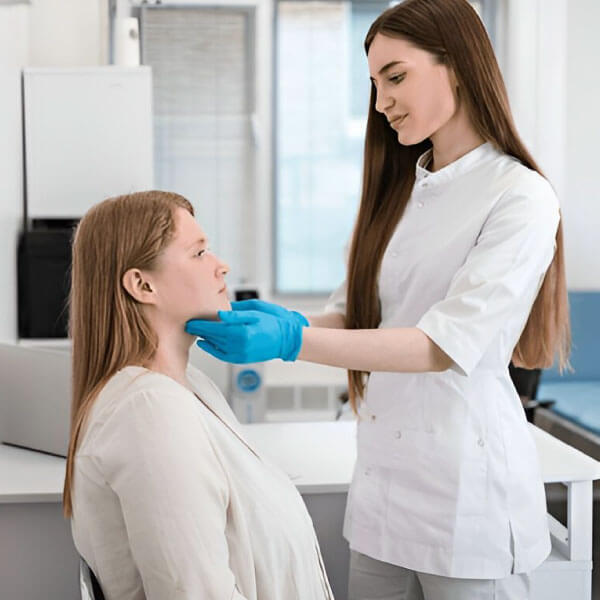
Thyroid problems can affect your sex life. When thyroid hormones are too high or too low, it may cause low desire, pain during sex, or emotional distress. Visit the DOXXES store on SW Freeway/Chimney Rock for support products that promote comfort and intimacy.
What Is Thyroid-Related Sexual Dysfunction?
This condition happens when thyroid hormone changes affect how your body responds during intimacy. You might feel:
- Less interest in sex
- Trouble getting aroused
- Erectile dysfunction
- Pain during sex
This discomfort can be on the surface, deeper in the pelvis, or triggered by movement.
Why Does It Happen?
Emotional factors:
- Worry about health or performance
- Relationship tension
- History of trauma or anxiety
- Poor body image
Physical causes:
- Hormone changes from thyroid disease
- Pelvic muscle tension
- Infections or inflammation
- Surgical scarring
Both mental and physical issues often play a role.
Real-Life Examples and How to Spot Triggers
Examples:
- Low thyroid (hypothyroidism): fatigue, low sex drive
- High thyroid (hyperthyroidism): racing heart, anxiety during sex
- Hashimoto’s: inflammation and pelvic pain
- Postpartum thyroid shifts: mood swings, low energy
Track your triggers:
- Journal symptoms, including timing and patterns
- Note changes in meds or mood
- Try gentle adjustments like new positions or lubricants
Who Is Affected?
Thyroid disorders can affect all genders:
In women:
- Vaginal dryness
- Painful sex
- Irregular periods
In men:
- Low desire
- Erectile issues
- Reduced sperm volume
Everyone’s experience is unique. Communication and care can help.
How a Sex Therapist Can Help
Therapists can bridge emotional and physical concerns:
- Explore stress and fear related to intimacy
- Spot anxiety or depression
- Teach muscle relaxation and intimacy exercises
- Support couples through guided conversations
Coping and Treatment Strategies
Therapy and Communication:
- Counseling to reduce stress
- CBT for mood and confidence
- Couples therapy to improve connection
Hormone Treatment:
- Adjusting thyroid meds to balance T3 and T4
- Regular lab checks with your doctor
Lifestyle and Mood Support:
- Address fatigue or depression
- Eat well, sleep better, stay active

How DOXXES Supports You
Our tools are designed for comfort, pleasure, and confidence:
- Water-based lubricants for dryness
- Pelvic floor trainers to support arousal
- Gentle vibrators for blood flow
- Prostate massagers for tension relief
We also offer product education for safe and confident use.
Talking with Your Partner
It’s okay to talk about intimacy. Here’s how:
- Be honest: “I’ve noticed a change and want to work on it.”
- Focus on your feelings, not blame
- Choose a quiet, relaxed time
- Learn together—use books or trusted websites
- Ask for help early if issues grow
Visit DOXXES on SW Freeway/Chimney Rock
Come explore intimate wellness products in a safe, supportive space. Our team can guide you with care and privacy.
Conclusion
Sexual changes from thyroid disorders are real, but manageable. With the right mix of treatment, support, and tools, you can feel better and reconnect. Visit DOXXES today to start your journey toward confidence and comfort.
FAQs
- Can thyroid issues affect sex?
Yes. Both overactive and underactive thyroids can cause fatigue, mood swings, and low sex drive. - What symptoms should I watch for?
Low interest, dryness, difficulty with arousal, or emotional changes like sadness. - How is it diagnosed?
With blood tests to check thyroid hormones (TSH, T3, T4). - Does DOXXES offer products that help?
Yes! Visit our SW Freeway / Chimney Rock store for wellness tools and lubricants. - Will thyroid meds help my sex drive?
They often do once your hormone levels are stable. - What if things don’t improve?
You may need a dose change or therapy to manage emotional stress. - Can men be affected too?
Yes. Men may have low libido, erectile dysfunction, or mood issues. - Is this tied to menopause?
Yes. Menopause and thyroid issues often overlap and affect intimacy. - Are there habits that help?
Yes. Exercise, sleep, and a good diet support hormone health. - Should I see a specialist?
Yes. An endocrinologist can help balance your thyroid and improve overall well-being.
